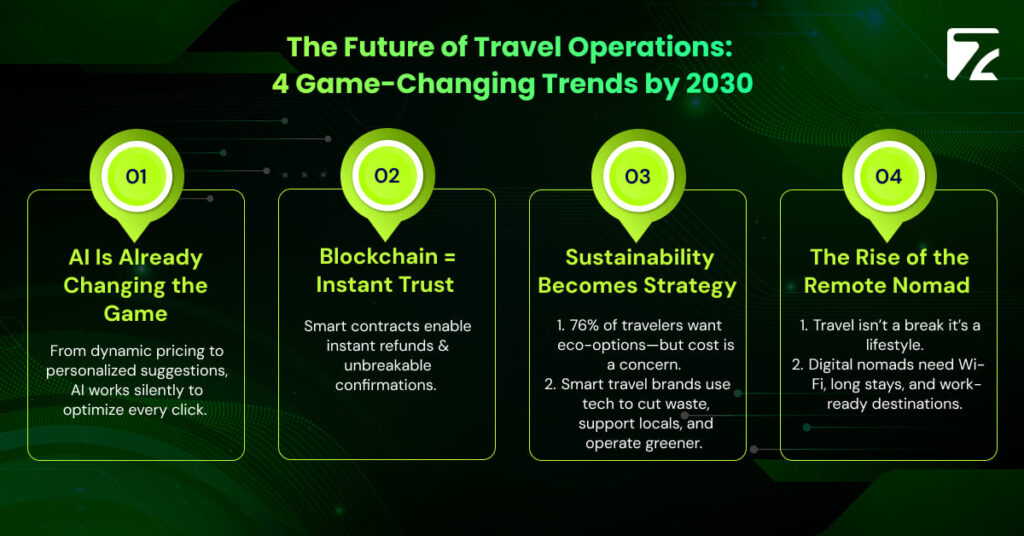Travel isn’t just bouncing back it’s evolving. You can feel it whether you’re booking a flight or managing a tour company’s backend. Expectations are higher. Technology is sharper. And let’s be real travelers aren’t just chasing deals anymore. They’re looking for something more personal, more seamless, more human.
It’s no longer just about where we go, but how we get there and what happens at every step. Behind every booking is a system that needs to be smarter, faster, and more responsive than ever before. This article walks you through 15 real trends do not fluff that are changing the way travel companies operate and travelers experience the world.

Let’s set the scene: you’re browsing flights online. You haven’t picked dates yet, but the site already knows what you’re thinking. It offers better options, suggests a bundle with a hotel, and reminds you to upgrade for a small fee. That’s AI and it’s not in your face, but it’s quietly working behind the scenes.
Today, travel businesses are using artificial intelligence to do more than automate emails. Airlines use it to predict no-shows and adjust bookings in real time. Hotels adjust room prices on an hourly basis depending on demand, events, or even the weather forecast.
We’re talking about systems that learn, adapt, and evolve with every click. It’s not about replacing people it’s about helping travel operators work smarter and serve better.
Blockchain isn’t just for crypto fanatics. In travel, it’s becoming a powerful tool for securing transactions and creating digital records that can’t be faked or lost.
Let’s say you book a wildlife tour. It gets canceled last minute. Usually, you’d wait days or weeks for a refund if it even comes. But with blockchain-based smart contracts? Your money comes back automatically. No emails. No support calls. Just an instant fix.
This technology is about accountability without middlemen, and it’s slowly transforming how we handle booking confirmations, cancellations, and supplier contracts.
Travel’s environmental footprint is massive. But more travelers than ever 76%, according to Booking.com want eco-friendly options. The challenge? Nearly half of them still think it’s too expensive.
Sustainable travel isn’t just about planting trees or skipping the mini shampoo bottles. It’s about making operations leaner and smarter. Think paperless check-ins, electric transfers, locally sourced food, and even rethinking the way tours are run to benefit communities directly.
The companies that can bake sustainability into their day-to-day operations not just market it are the ones that will earn long-term loyalty.
Once remote work went mainstream, it changed the meaning of travel. Now, travelers are also part-time locals. They’re working from cafes in Lisbon, beach huts in Goa, or mountain homes in Himachal.
These “digital nomads” need Wi-Fi, quiet spaces, and flexible bookings. They aren’t on vacation they’re living life elsewhere. That’s a big shift for hotels, tour operators, and even local businesses. The travel industry must now cater to longer stays and a hybrid lifestyle that blends work and adventure.
Imagine knowing which destinations will trend before they go viral. Or which customers are most likely to book a luxury upgrade. That’s the power of big data in travel.
Companies are digging deep into customer behavior past bookings, browsing history, even email opens to fine-tune marketing and service delivery. This means smarter offers, fewer empty rooms, and better customer experiences.
But this isn’t just about selling more. It’s about making operations more responsive and reducing guesswork at every level.
Let’s be honest how many people still use desktop to book travel? Mobile is now the default. Booking a trip from a phone while waiting for coffee is the new normal.
And it’s not stopping there. Voice search “Hey Google, find cheap weekend getaways” i s growing. Smart travel companies are optimizing their websites and booking systems to handle this kind of natural, spoken query.
If you’re not mobile-friendly and voice-ready, you’re leaving bookings on the table.
Finance teams often spend hours matching bookings with supplier invoices. RPA bots can automatically pull the data, compare values, check for currency mismatches, and raise alerts for human review. It’s faster, and less prone to errors caused by long Excel nights.
Why book one trip when you could subscribe to many? Subscription-based travel services are gaining traction think flight passes, monthly hotel credits, or bundled luxury perks.
For travelers, it’s about convenience. For companies, it’s predictable revenue. But the key is keeping the experience smooth, exclusive, and valuable enough to keep customers subscribed month after month.
The pandemic rewired how we view cleanliness. Contactless check-ins, digital keys, and visible hygiene practices are now expected not appreciated, but assumed.
Operations that make guests feel safe (and show them how) are earning trust and loyalty. It’s not about fear it’s about comfort, control, and consistency.
Can’t decide between two resorts? One shows you photos. The other lets you walk through a virtual tour.
Guess which one wins?
AR and VR are giving customers a feel for what they’re booking long before they arrive. Whether it’s previewing a hotel room or navigating an airport, these tools reduce anxiety and boost bookings.
With almost half of travel-related emissions coming from transport, greener options are in demand. And not just from environmentalists.
Think trains over flights, electric transfers instead of diesel vans, and offering carbon offset at checkout. These aren’t just good for the planet they’re great for your brand.
We’ve all done it scrolled past a dreamy beach reel on Instagram and thought, “I need to go there.”
Social platforms aren’t just for inspiration anymore. With features like “book now” buttons and direct links, discovery and action happen in the same breath. And that changes how travel brands plan content, partnerships, and conversions.
People want freedom when they spend. That’s why Buy Now, Pay Later (BNPL) is booming in travel.
From trip insurance to instant refunds and EMIs for international bookings, fintech tools are smoothing out friction. And let’s be real when travel’s expensive, flexibility becomes a deal-breaker.
If COVID taught us anything, it’s that disruption can strike fast. The travel companies that survived had contingency plans.
Think flexible supplier contracts, real-time communication tools, generous refund policies, and scalable support teams. Resilience is now a competitive edge not just a risk strategy.
Travel never sleeps and most in-house teams can’t be on 24/7. That’s where smart outsourcing comes in.
Today, it’s not just about saving money. It’s about tapping into expert teams who specialize in customer service, backend ops, reconfirmation, and more so internal teams can focus on growth.
The trends above aren’t predictions. They’re reality. The companies that understand, embrace, and act on these shifts will be the ones leading the charge in the next decade.
The future of travel operations is digital, personal, sustainable, and resilient. And if you’re in the game, now’s the time to level up.
The future of travel operations revolves around intelligent automation, hyper-personalized experiences, and sustainable, resilient systems. From AI-driven booking platforms to blockchain-based transactions and mobile-first solutions, operations are becoming more data-driven, customer-centric, and environmentally conscious.
AI helps automate and optimize everything from customer service to inventory management. It enables predictive pricing, chatbots for 24/7 support, personalized recommendations, and intelligent demand forecasting making operations smarter and more efficient.
Sustainability is no longer optional. Travelers increasingly expect eco-friendly practices. Operational sustainability like using electric vehicles, paperless check-ins, and carbon tracking is crucial for minimizing environmental impact and aligning with consumer values.
Blockchain enhances security, transparency, and efficiency. It prevents fraud, automates refunds through smart contracts, and ensures bookings and payments are traceable, accurate, and secure.
Remote work has birthed a new type of traveler the digital nomad. Travel operations must adapt with longer-stay packages, flexible schedules, fast Wi-Fi, and workspace-friendly accommodations.

Travel Automation Expert